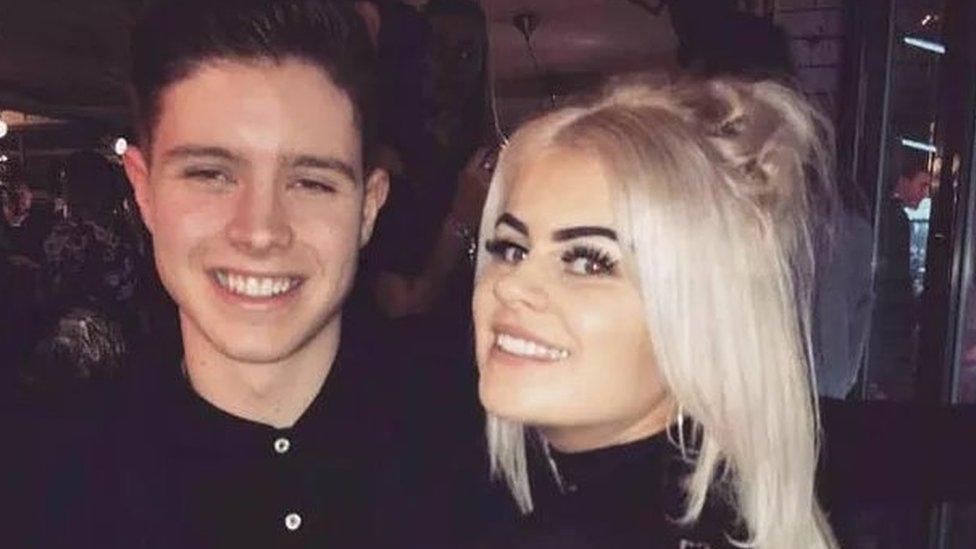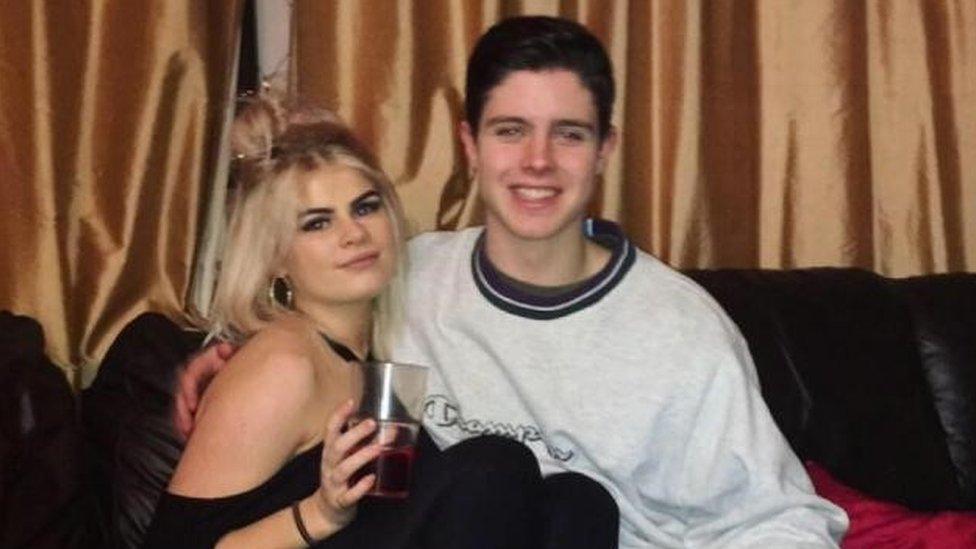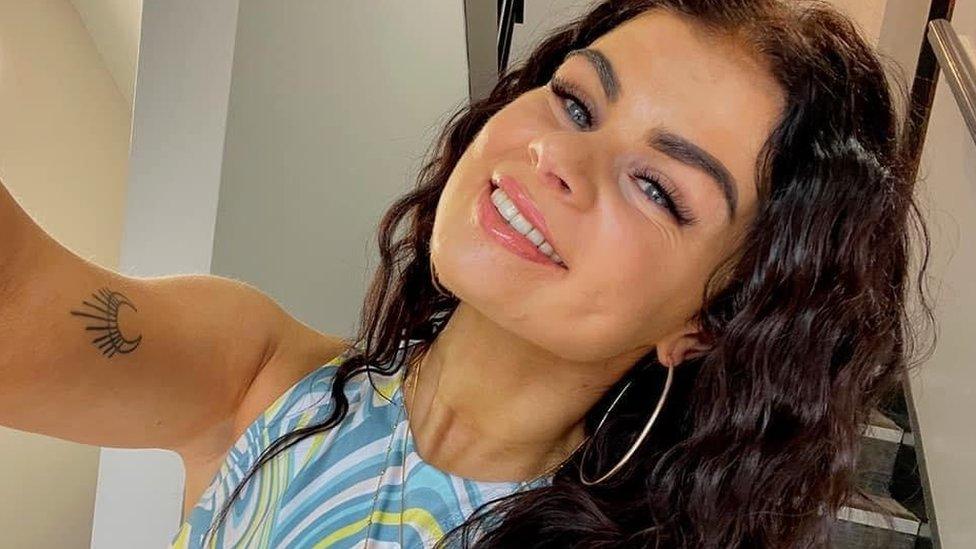'Rebuilding my life after my boyfriend nearly killed me'
- Published

Esther Garrity nearly died when her boyfriend attacked her on a night out
Six years ago, Esther Garrity was almost stamped to death by her then-boyfriend on a night out. She told the BBC about how she rebuilt her life.
The most notable difference is the colour of her hair.
Now Esther sees herself as two different people; the one before the attack and the woman after.
Describing her blonde-haired, 18-year-old self as "little Esther", six years on from the attack that nearly killed her she routinely dyes her hair brown.
The blonde hair belongs to the girl who was left clinging to life, the brunette represents the woman she has built herself to be in the aftermath.
But referring to "Little Esther", she says: "I love that girl. Everything I do now is for her."

Esther was 18 and Farley 21 when he attacked her
It was a chilly evening in April 2017 and Esther was out for drinks with her boyfriend Sam Farley in their hometown of Middlesbrough.
They had got together the previous September and she would make regular weekend visits home from her studies in Manchester to see him.
What started with a young couple out enjoying themselves ended with Esther being treated for catastrophic brain injuries and Farley arrested for her attempted murder.

If you have been affected by issues in this article there is help and support at BBC Action Line.

Esther's mum Victoria still vividly recalls the knock at the door in the middle of the night.
A police officer said Esther had been attacked and they were there to take her to her daughter.
After pulling on a hoodie and leggings, she was rushed to Esther's side at James Cook University Hospital, blue lights flashing.
When she arrived at the regional trauma centre, she was only able to recognise her daughter by her eyebrows.
Esther's head was badly swollen and Victoria felt her legs buckle as she collapsed to the hospital floor.
An intensive care nurse, Jessica, spent hours combing the blood from Esther's long hair so it wouldn't need to be shaved off.
A paramedic who attended the callout later said they were the worst injuries he'd seen on someone who went on to survive.

The young couple had been together for eight months before he nearly killed her
Farley was 21 when he attacked Esther.
He broke her jaw, knocked out several teeth, and caused severe brain swelling when he hit her to the ground and stamped on her head 17 times.
When the police arrived he was heard shouting "I am God".
He had taken LSD, cocaine and ketamine.
At his sentencing hearing, his defence barrister said it was that cocktail of drugs that caused the violent assault that left his girlfriend fighting for her life on the side of the road.
Initially charged with attempted murder, he was jailed for 12-and-a-half years after admitting grievous bodily harm with intent at Teesside Crown Court.
At first their relationship had seemed strong.
But looking back now Esther describes it as "love bombing" - the practice of lavishing someone with attention and affection often as a means to manipulate them.
When Esther challenged Farley on some of his behaviours he would say that was "Bad Sam", an alter ego he created to distance himself from his unsavoury actions.
These included telling her not to hang out with certain friends, or that she couldn't go to club nights he disapproved of and losing his temper over things like paying for taxis, Esther says.
She took videos of these occasions as evidence of "Bad Sam".

Esther used to have blonde hair...

...but has dyed it darker ever since being attacked
On the night of the attack, Esther had been messing about with a male friend, the pair pushing each other around in trolleys.
Farley would later use that in his police interview as the basis of a false claim that Esther had cheated on him.
He also said he had a voice in his head telling him to "leave her".
When police showed him a photograph of the injuries he had caused her, he told them he "didn't need to see that" and pushed it away.
Esther spent three weeks in a coma and almost four months in hospital.
To the astonishment of her mother and friends, Esther stood by Farley during court proceedings and for four years while he was in prison for attacking her.
She would be by the phone at 11:45 every day to get his call, missing lunches and meetings with friends.
In prison letters sent to Esther, seen by the BBC, he praised her for always answering on the first or second ring.
In 2021 she finally saw the light, that was she was still "under his spell", Esther recalls.

Esther now works as a fitness instructor
As well as extensive medical treatment, she received counselling and support from domestic abuse charities and is now urging other women to be aware of the warning signs.
"Abuse is a choice," she says, adding: "There's a lot of things that people didn't see, he always had an excuse to do what he did."
She said she no longer thinks about Farley, who was released from prison in August, adding: "He's dead to me."
Esther now works as a personal trainer and, though she is happy, she still feels the effects of the attack.
She struggles with memory and relies on apps to plan her time, while her mum does her food shopping and writes emails for her.
But the biggest visual change is still her hair.
"I feel blonde on the inside, but I don't like being blonde because it reminds me that's what I looked like then," she says.
"So I stick to brunette, though it doesn't really feel like me.
"Whenever I'm feeling down, I just imagine me holding Little Esther's hand and I go 'come on, we are confident, we are fearless, we've got this'."
She says she is excited for her future and becoming a "stronger and better version" of herself.
"Trauma doesn't define you," Esther says.

Follow BBC North East & Cumbria on X (formerly Twitter), external, Facebook, external and Instagram, external. Send your story ideas to northeastandcumbria@bbc.co.uk, external.
Related topics
- Published1 November 2017
